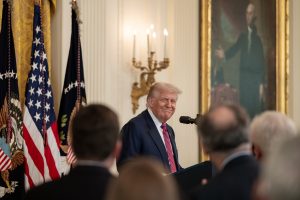The United States and Indonesia have revealed more details about the trade agreement that President Donald Trump announced last week, under which the U.S. agreed to lower its tariff on Indonesian goods to 19 percent.
In a post on this truth Social media platform, Trump hailed the deal, calling it a “huge win for our Automakers, Tech Companies, Workers, Farmers, Ranchers, and Manufacturers.”
Trump initially announced the deal with Indonesia on July 15, stating on Truth Social that “they are going to pay 19%” while the U.S. would gain tariff-free access to the Indonesian market. Trump also said that Indonesia had agreed to buy $15 billion of U.S. energy products, $4.5 billion of American farm products, and 50 Boeing jets as part of the deal.
As with earlier deal with Vietnam, further details were scanty. In a joint statement released yesterday, shortly after Trump announced a trade deal with the Philippines, Jakarta and Washington provided further details for the proposed United States-Indonesia Agreement on Reciprocal Trade, adding that the agreement would be finalized by the two nations in “the coming weeks.”
The two nations have “agreed to a Framework for negotiating an Agreement on Reciprocal Trade to strengthen our bilateral economic relationship, which will provide both countries’ exporters unprecedented access to each other’s markets,” the statement said.
As part of this agreement, it added, Indonesia has agreed to remove “approximately 99 percent of tariff barriers for a full range of U.S. industrial and U.S. food and agricultural products.” In return, the statement reaffirmed that the U.S. will drop its tariff on Indonesian products from the 32 percent announced by Trump in April to 19 percent. It added that the U.S. “may also identify certain commodities that are not naturally available or domestically produced in the United States for a further reduction in the reciprocal tariff rate.”
The 19 percent tariff is equivalent to the rate that the U.S. has imposed on the Philippines, in a deal announced by Trump yesterday, and is slightly lower than the 20 percent that he said has been agreed with Vietnam.
The two nations will “work together to address Indonesia’s non-tariff barriers that affect bilateral trade and investment in priority areas” and have contributed to the $17.9 billion U.S. trade deficit with Indonesia.
This includes “exempting U.S. companies and originating goods from local content requirements” and “accepting vehicles built to U.S. federal motor vehicle safety and emissions standards.”
Jakarta has also agreed to “the removal of import restrictions or licensing requirements on U.S. remanufactured goods or their parts” and “the elimination of pre-shipment inspection or verification requirements on imports of U.S. goods.” The latter requirements, a senior Trump administration official told reporters in a conference call yesterday, have posed problems for U.S. agricultural exports and contributed to a growing U.S. farm trade deficit, Reuters reported.
The joint statement adds that Jakarta and Washington “will negotiate facilitative rules of origin” to ensure that goods from third nations (i.e. China) are not routed through Indonesia to avoid U.S. tariffs. Indonesia also has agreed to remove export restrictions on industrial commodities, including critical minerals, the joint statement said.
According to Reuters, the Trump administration official also added that Indonesia “will immediately drop its plans to levy tariffs on internet data flows and it agreed to support renewal of a longstanding World Trade Organization moratorium on e-commerce duties.”
As with the Philippines, which has similarly opened its market to U.S. imports for just a 1 percent reduction in the tariff, it is unclear exactly what Indonesia is getting from the deal, apart from relief from further tariff pain.
As Trystanto Sanjaya of the Norwegian Institute of International Affairs wrote on X, “Indonesia is literally opening the dam for US exports to come in with very little (if any) regulation from the Indonesian side.” He added that the removal of all restrictions on the export of critical minerals to the U.S. could spell the effective end to the country’s “downstreaming” policy, which seeks to encourage foreign firms to set up processing facilities (particularly for nickel) in Indonesia, in order to ensure that the country captures the majority of the benefits from its natural resources.
While Trump may be able to trumpet a victory in the short term – and he is certainly under domestic political pressure to produce tariff “deals” – the longer-term benefits for the U.S. remain much less clear. Southeast Asian nations that rely heavily on the U.S. market have little choice but to accept Trump’s terms, but the U.S. turn toward brute-force protectionism and mercantilism is already spurring a regional turn away from economic engagement with Washington and toward more reliable, predictable, and “like-minded” partners. In time, Trump’s “Liberation Day” tariff announcement may be seen as a turning point in the regional contest for influence between the U.S. and China.

































